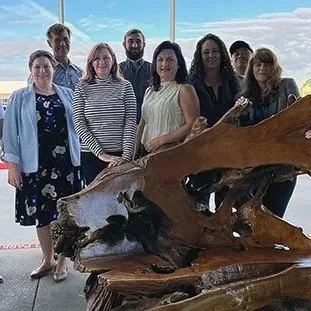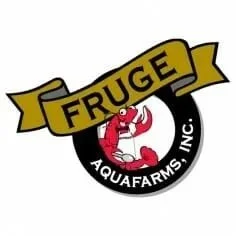The mission of the United States Department of Agriculture's Food Safety and Inspection Service is to make sure that food that is presented for human consumption meets certain quality and health standards. When a product does not meet those standards or has not undergone an FSIS inspection, that product is pulled from the market until the specified violations have been rectified.
Read MoreThe Loreauville Canal Control Structure, a decades-old piece of infrastructure in Iberia Parish, has recently undergone a major rehabilitation project to safeguard the region’s freshwater supply.
Originally built to prevent saltwater intrusion, the structure plays a key role in allowing the Teche-Vermilion Fresh Water District to manage the freshwater that flows into Bayou Teche and through the parish’s waterways.
Read MoreAfter four people have died and several others became sick after eating raw Gulf oysters contaminated with the flesh-eating bacteria Vibrio vulnificus, the LSU Ag Center is urging you to use caution before eating raw oysters. Seafood extension specialist Evelyn Watts says the risk is especially high during the summer.
“Oysters are affected by Vibrio vulnificus. That is a pathogen that mostly grows in brackish or salt water. Mostly, it’s going to be in the warm months,” Watts explained.
Read MoreLouisiana produces 850 million pounds of seafood each year, according to the Louisiana Seafood Promotion & Marketing Board. Much of that includes crustaceans like crawfish, shrimp, and crab.
Read MoreTwo people recently died in Louisiana after eating raw Gulf oysters contaminated with the flesh-eating bacteria Vibrio vulnificus. Now that we have returned to the “r” months of autumn, a period historically considered safer to consume the mollusks on the half shell, seafood lovers are rightfully on edge about enjoying what many consider a saltwater delicacy.
Read MoreThe Louisiana Department of Wildlife and Fisheries is shedding light on the August Venture Global dredging spill in Cameron Parish.
LDWF confirmed what fishermen have been saying for weeks: the mud has made its way into Big Lake and is affecting the fisheries.
Read MoreShrimping has been an industry and a tradition for over a century, but for many on the job, there are concerns about what comes next.
Fourth-generation shrimper, St. Mary Councilman, and member of the Louisiana Shrimp Task Force, Rodney Olander says shrimping today isn't what it used to be.
Read MoreApplications are now being accepted for the Louisiana Sea Grant Fisheries and Seafood Leadership Program.
The program launched in 2023 to help enhance leadership in the Louisiana Commercial Fishing and Seafood Industry.
The Louisiana Sea Grant Fisheries & Seafood Leadership Program (FSLP) is a one-year program divided into four, two-day workshops for networking and skill-building. It includes seminars with experts, on-site tours, personal skills improvement, and meetings with business and government leaders in Louisiana.
Read MoreLieutenant Governor Billy Nungesser is renewing his call for President Trump and Louisiana’s Congressional delegation to impose a 10-cent-per-pound seafood inspection fee.
“That would allow them to hire thousands of inspectors to inspect more imported seafood. We inspect less than 5% of the imported seafood,” Nungesser explained.
Read MoreUniversity of Louisiana at Lafayette biologists and undergraduate and graduate students are examining the effectiveness of invasive carp as crawfish bait, research that’s being funded by the Louisiana Department of Wildlife and Fisheries.
Read MoreYou've probably seen the headlines and read the story. If you haven't, you can follow this link to learn more about the recent recall of frozen shrimp that had to be made by the giant retailer Walmart. Federal investigators say the shrimp imported from Indonesia showed signs of possible radioactive contamination.
Here in Louisiana, this story affects us in a lot of different ways, but maybe, just maybe, this "nuclear shrimp" imported from southeast Asia can be the bombshell that finally blows the lid off one of the greatest injustices in American agriculture. We have to protect American farmers/fishermen from cheaper, inferior imported products.
Read MoreDespite being called a “cruise,” the people on board The Pelican described the experience on the hypoxia monitoring expedition as very different from the elaborate dinners on a towering vacation ship or booze- and buffet-filled Caribbean itinerary.
Passengers describe waves up to 5 feet high in the Gulf of Mexico, swinging the 116-foot research vessel like a pendulum, plaguing anyone who didn’t have sturdy sea legs with bouts of seasickness. Daytime temperatures in late July soared ever higher as sweat dripped down the backs of hard-hat covered heads.
Read MoreVisitors and locals alike flocked to Delcambre for the final day of the 73rd Annual Shrimp Festival, enjoying a vibrant atmosphere filled with food, music, and camaraderie.
First-time festival-goer Joe Tamporello expressed his enthusiasm, saying, “We just come out here, and got some food to eat. And we’re going to have a couple of drinks and listen to the band.”
Read MoreA local farm using its own rice to make whiskey and vodka was featured on “Farms of America” on the Cowboy Channel Monday night.
Frugé Aquafarms is a full service seafood company covering major markets in Louisiana, Texas and Oklahoma, which began when Mike and Mark Frugé first started crawfish farming to make money in college.
Read MoreAfter a 10-day delay, inshore shrimp season opened Monday. Louisiana Shrimp Association President Acy Cooper says the later start to the season is actually a very good thing.
“They wanted to open August 1, and everybody was pretty much against it because we still had a lot of small shrimp. So they wanted to leave it closed for a couple more weeks to see if we could get a little bit bigger size,” Cooper said.
Read More














